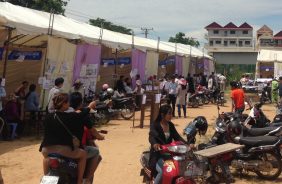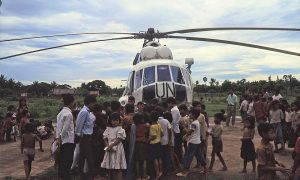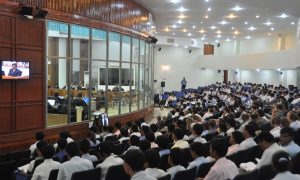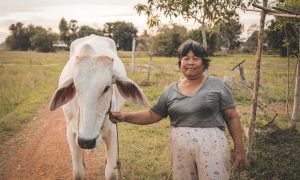Click here to go to read in Khmer
This year marks the 30th anniversary of the signing of the Paris Peace Agreement. In light of its significant contribution to Cambodian development and stability, it is important to explore its continued, and contestable, relevance in the 21st century.
Prior to its adoption, the Cambodian people lived through a devastating civil war whereby external Cold War power dynamics contributed to the contracted political space for sovereign determination.
The adoption of the Paris Peace Agreement (PPA) was therefore a historical milestone that ushered in the end of a bloody regime; laying the foundations for the Cambodian people to take control of their future. The primary purposes of the PPA can be considered to be the establishment of an independent and sovereign government, by installing a democratic system through free and fair elections, and the protection of Cambodian lives by translating human rights into constitutional law.
The value of the PPA was not only as a treaty to end the political crisis in Cambodia but also for the foundation it established to ensure that the turmoil of civil war would not return. More specifically, it created a neutral political environment where Cambodians have freedom of choice in determining political representation.
A month after the 1993 election, a former Cambodian national UNTAC staff member sent a letter to UNTAC Radio to broadcast his belief in the state-building mission undertaken under the PPA.
“I’m writing to call all compatriots to abandon selfishness by taking common ground into account instead,” he wrote. “If you love any political party, that’s your opinion, and it’s a contribution to state-building based on your perspective, expressed through the election,” he further added (click here to download the transcript of this broadcast in Khmer).
This adoption of free and fair elections was a remarkable achievement of the PPA when set against the turmoil that preceded its adoption.
In 1992, to implement the PPA, The United Nations Transitional Authority in Cambodia (UNTAC) was established to run the first free and fair election within the framework of the Agreement on a Comprehensive Political Settlement of the Cambodian Conflict (1991). It was the first time that the United Nations took on the independent administration of another state to end a civil war and replace it with measures for the peaceful transition of power.
In 1993, the first free and fair election post-PPA took place. The election resulted in National United Front for an Independent, Neutral, Peaceful, and Cooperative Cambodia (FUNCIPEC) winning 45.47% of votes, followed by the Cambodia People’s Party (CPP) with 38.23%. Later the CPP, led by Hun Sen, a former foreign minister of the Vietnamese-backed People’s Republic of Kampuchea government (PRK), rejected the result by citing “massive voting irregularities.” Prince Norodom Sihanouk immediately expressed fear that Cambodia could split, “This is a tragedy for all of us,” he said. Four years later, in July 1997, the CPP and FUNCINPEC exchanged gunfire for two days in Phnom Penh in conflict over the future leadership of Cambodia future leader of Cambodia.
My family experienced this conflict in 1997. After a rocket landed near our house, my mother carried me and took my older sister to hide in a neighbour’s brick house. After my father returned home in the evening, we waited until morning to escape the city. My parents decided to risk their lives while gunfire was heard along the way without knowing whether we might get hit by bullets. My parents realised Cambodia could fall into a civil war again.
This armed conflict can be seen as undermining what the PPA called a sovereign government elected through the UNTAC-organised election in 1993, which was the central value of the PPA for a peaceful transition of power.
The CPP took the leadership and continued to win elections from one mandate to another, resulting in Hun Sen becoming currently Asia’s longest-serving leader. However, some civil society groups, analysts and researchers, and the international community, have criticised the situation of human rights and political freedoms under his tenure. The 2018 election provides a window of insight to this end. It was viewed with disappointment by many in the international community as well as some Cambodian citizens.
A year before the election, the largest opposition party, the Cambodia National Rescue Party (CNRP), was dissolved by the Supreme Court after its leaders were tried for treason. This saw 118 CNRP-party members banned from political activity for five years. At the same time, the government shut down the US-based National Democratic Institute (NDI), which had operated since 1992, for colluding with the CNRP. It also closed the Cambodia Daily newspaper and Radio Free Asia’s bureau (RFA) in Phnom Penh, ostensibly due to tax issues.
Some observers and those in the international community believed it was politically motivated and linked to the 2013 election result when CPP lost 22 seats in parliament for a total of 68 seats while the CNRP won 55 seats. But later, the government denied such statements by citing the legal charges that motivated the circumstance. This crackdown was described as being on “the brink of abolishing the Party [CNRP] outright” by some analysts.
In light of the dissolution of their only major challenger, it has been suggested that the CPP stood as the only feasible candidate in the 2018 election. Multiple political parties did participate on the ballot, which might be seen by some people as a hallmark of a multiparty democracy.
However, the concept of a “free and fair” election, the primary legacy of the PPA, should not be ignored. Multi-party political systems alone cannot be categorised as democratic if elections are not free and fair.
The European Union (EU) and the United States of America (US) found it necessary to withdraw their support and trust in the legitimacy of the 2018 election results. Japan also joined them in expressing concern over the dissolution of the CNRP, but Japan continued to assist Cambodia’s National Election Committee (NEC). Later, a large number of invalid ballots were discovered to the disappointment of Japan. Japanese Foreign Minister Taro Kono expressed these concerns over the election results when meeting with Cambodian foreign minister, Prak Sokhonn, in Singapore
“I told Mr. Prak Sokhonn that the results were disappointing in many ways as many of the ballots were judged invalid, although Japan had given its support to ensure that the polls would reflect the will of the voters,” Kono said.
As a matter of fact, more doubts were raised about the election when the government threatened criminal charges against people who called for voters to boycott the election, and garment workers faced repercussions from employers for not voting at the workplace. Even though no concrete evidence of the declining legitimacy of the 2018 election was found, a large number of invalid ballots reflected the discontent of many people.
In 1993, another letter from a villager to UNTAC Radio expressed their concern over safety in his/her area “How much more suffering for Cambodian people? Since I was born, I have known only deprivation and hunger because of enemy invasion, American bombing, and the Pot Pol genocide. People died in misery and extreme poverty.” UNTAC Radio also received a poem from another villager saying that “others and I want Rights. Rights make us more knowledgeable and dare to speak out …Rights can be eyes and nose …to advise to build the country.” (Click here to download the transcript of this broadcast in Khmer).
These messages describe how Cambodian people’s rights have been infringed on for a long time, and they also want the right to live in a better society.
Human rights and freedom of expression are crucial components of the PPA’s legacy. The provision establishes the goals of a fundamentally democratic system and an independent justice system.
In the last two years, during the COVID-19 outbreak, some proponents of these fundamental elements have faced severe struggles. In 2020 alone, at least 14 activists, including environmentalists, politicians, and rappers, were arrested for voicing concerns over environmental and social matters. In 2021, another three environmental activists from the group Mother Nature were detained in June for alleged illegal organising and using terrorist financing. The action took place after the trio filmed sewage in the river near the Royal Palace. Later, without disclosing evidence publicly, the Phnom Penh Municipal Court charged them with plotting and insulting the king. Representatives of the US, France, Australia, Sweden, and many NGOs raised their concerns over freedom of expression and demanded that the accused be released.
This response from the Cambodian government could create a culture of fear among Cambodian youth if they believe they could easily be charged and their right to freedom of expression is not guaranteed. It also discourages people, especially youth, from talking about social issues. In their advocacy on issues of concern, as in the case above, youth sought explanations from the government, but instead they were charged and taken to court. The legacy of the PPA should have been encouraged and tolerated rather than restricted.
The legacy of the PPA is invaluable to building a nation by taking national interest into account through a democratic system (free and fair elections) where people can enjoy prosperity without fear. This legacy has no end date; it must continue while encouraging the Cambodian people to get involved.
To sustain the PPA’s legacy, civic education (especially about democratic elections) must be taught to a well-informed population through educational institution and civil society programs in the community. This provides fundamental knowledge to all people, especially new generations, to view their social situation through a lens of critical thinking rather than through manipulation by political parties. Specifically, political education should be encouraged among youth. When Cambodians hear the word “politics,” many assume it to be the propaganda of a political party whether true or not. Understanding political theory work will open their eyes to critically see the political issues and choose the right leaders based on their will.
The 2017 commune elections don't point to a decisive result for either the CPP or CNRP next year.
Cambodia’s society is changing fast, and its parties slowly
Equally important, civil society and relevant stakeholders such as government and lawmakers must be willing to hold regular public forums on legal concepts and civic rights. For example, there remains confusion as to the precise legal difference between, and repercussions related to, the terms “criticism” and “incitement”. In September this year, Phnom Penh’s court sentenced seven CNRP activists CNRP to prison, for “incitement” over social media posts criticising the government’s handling of the Covid-19 pandemic. However, the activists and some civil society organisations argued that social media posts should be subject to the right to freedom of speech. A forum would provide space for dialogue and clarity.
However, this effort faces challenges when both parties are not willing to cooperate. To make this initiative happen, all parties must agree to allow diverse stakeholders to monitor and evaluate programs to avoid any manipulation for political gains.
In addition, both parties also need to acknowledge that they would encounter problems during implementation. Thus, mutual understanding is needed to address these issues step by step.
This is the right thing to do because both civil society and the government have roles in educating people about the law, its implementations, and their legal rights.
Finally, on every anniversary of the PPA, relevant entities should publish related material through documentaries, storytelling, and publications. It would allow new generations to understand its mission and legacy, which solved the political crisis by giving Cambodian citizens power and freedom of choice. This legacy will continue to ensure peace for all generations going forward.
កេរដំណែលនៃកិច្ចព្រមព្រៀងសន្តិភាពទីក្រុងប៉ារីស ក្រោយរយៈពេល ៣០ ឆ្នាំ
ឆ្នាំនេះគឺជាខួបទី ៣០ នៃការចុះហត្ថលេខាលើកិច្ចព្រមព្រៀងសន្តិភាពទីក្រុងប៉ារីស។ ដោយសារការរួមចំណែកដ៏សំខាន់នៃកិច្ចព្រមព្រៀងនេះចំពោះការអភិវឌ្ឍនិងស្ថិរភាពនៅកម្ពុជា, វាជាការសំខាន់ដើម្បីឈ្វេងយល់អំពីភាពពាក់ព័ន្ធរបស់វាដែលនៅតែមានបន្តនិងមានការជជែកខ្វែងគំនិតគ្នានៅសតវត្សរ៍ ទី២១។
មុននឹងអនុវត្តកិច្ចព្រមព្រៀងសន្តិភាព ប្រជាជនកម្ពុជាបានឆ្លងកាត់សង្គ្រាមស៊ីវិលបំផ្លិចបំផ្លាញដោយសារតែអំណាចឌីណាមិកនៃសង្រ្គាមត្រជាក់ខាងក្រៅដែលនាំឱ្យប៉ះពាល់ដល់លំហនយោបាយរបស់កម្ពុជាក្នុងការកំណត់អធិបតេយ្យភាពរបស់ខ្លួន។
ការអនុវត្តកិច្ចព្រមព្រៀងសន្តិភាពទីក្រុងប៉ារីសគឺជាព្រឹត្តិការណ៍ប្រវត្តិសាស្ត្រមួយដែលបាននាំមកនូវការបញ្ចប់នៃរបបបង្ហូរឈាម។ ការបង្កើតមូលដ្ឋានគ្រឹះសម្រាប់ប្រជាជនកម្ពុជាដើម្បីគ្រប់គ្រងអនាគតរបស់ ខ្លួន។ គោលបំណងចំបងនៃកិច្ចព្រមព្រៀងសន្តិភាពទីក្រុងប៉ារីស អាចចាត់ទុកថាជាការបង្កើតរដ្ឋាភិបាលឯករាជ្យនិងមានអធិបតេយ្យ ដោយការបង្កើតប្រព័ន្ធប្រជាធិបតេយ្យតាមរយៈការបោះឆ្នោតដោយសេរីនិងត្រឹមត្រូវ និងការការពារជីវិតប្រជាជនកម្ពុជាតាមរយៈដាក់បញ្ចូលសិទ្ធិមនុស្សទៅក្នុងរដ្ឋធម្មនុញ្ញ។
គុណតម្លៃនៃកិច្ចព្រមព្រៀងសន្តិភាពទីក្រុងប៉ារីសមិនត្រឹមតែជាសន្ធិសញ្ញាបញ្ចប់វិបត្តិនយោបាយនៅ កម្ពុជាប៉ុណ្ណោះទេ វាថែមទាំងជាមូលដ្ឋានគ្រឹះដែលបង្កើតឡើងដើម្បីធានាថាភាពចលាចលនៃសង្គ្រាម ស៊ីវិលនឹងមិនវិលត្រលប់មកវិញឡើយ។ ជាពិសេសជាងនេះទៅទៀត វាបានបង្កើតបរិយាកាសនយោបាយអព្យាក្រឹត្យដែលប្រជាជនកម្ពុជាមានសេរីភាពក្នុងការជ្រើសរើសតំណាងនយោបាយ។
មួយខែបន្ទាប់ពីការបោះឆ្នោតឆ្នាំ១៩៩៣ អតីតបុគ្គលិកជាតិរបស់ អ៊ុនតាក់ ម្នាក់បានផ្ញើលិខិតមួយច្បាប់ទៅវិទ្យុអ៊ុនតាក់ដើម្បីផ្សាយជំនឿរបស់គាត់ចំពោះបេសកកម្មកសាងរដ្ឋដែលបានអនុវត្តក្រោមកិច្ចព្រមព្រៀងសន្តិភាពទីក្រុងប៉ារីស។
លោកបានសរសេរថា “ខ្ញុំសរសេរលិខិតនេះដើម្បីអំពាវនាវឱ្យជនរួមជាតិទាំងអស់បោះបង់ចោលភាពអាត្មានិយមដោយយកចំណុចរួមមកគិតជំនួសវិញ”។ លោកបានបន្ថែមថា “ប្រសិនបើអ្នកស្រឡាញ់គណបក្សនយោបាយណាមួយនោះគឺជាគំនិតរបស់អ្នកហើយវាជាការរួមចំណែកក្នុងការកសាងរដ្ឋដោយផ្អែកលើ ទស្សនៈរបស់អ្នកដែលបានសម្តែងតាមរយៈការបោះឆ្នោត”។ (ដកស្រង់ពីលិខិតទៅវិទ្យុអ៊ុនតាក់ឆ្នាំ ១៩៩៣៖ ការបកប្រែនិងសេចក្តីសង្ខេបក្រៅផ្លុវការដោយអ្នកនិពន្ធ)។ (click here to download the transcript of this broadcast in Khmer)
ការអនុវត្តការបោះឆ្នោតដោយសេរីនិងយុត្តិធម៌នេះគឺជាសមិទ្ធផលគួរឱ្យកត់សម្គាល់នៃកិច្ចព្រមព្រៀង សន្តិភាពទីក្រុងប៉ារីសនៅពេលប្រឆាំងនឹងភាពចលាចលដែលបានកើតឡើងមុនការអនុវត្តកិច្ចព្រមព្រៀងនេះ។
នៅឆ្នាំ១៩៩២ ដើម្បីអនុវត្តកិច្ចព្រមព្រៀងសន្តិភាពទីក្រុង អាជ្ញាធរបណ្តោះអាសន្នអង្គការសហប្រជាជាតិប្រចាំនៅកម្ពុជា (អ៊ុនតាក់) ត្រូវបានបង្កើតឡើងដើម្បីរៀបចំដំណើរការការបោះឆ្នោតដោយសេរីនិងយុត្តិធម៌លើកដំបូងនៅក្នុងក្របខ័ណ្ឌនៃកិច្ចព្រមព្រៀងស្តីពីការដោះស្រាយបញ្ហានយោបាយរួមមួយនៃជម្លោះកម្ពុជា (១៩៩១) ។ នេះគឺជាលើកទីមួយហើយដែលអង្គការសហប្រជាជាតិបានធ្វើជាអ្នកគ្រប់គ្រងរដ្ឋបាលឯករាជ្យនៃរដ្ឋមួយផ្សេងទៀតដើម្បីបញ្ចប់សង្គ្រាមស៊ីវិល ហើយជំនួសវាដោយវិធានការសម្រាប់ការផ្លាស់ប្តូរអំណាចដោយសន្តិវិធី។
នៅឆ្នាំ ១៩៩៣ ការបោះឆ្នោតដោយសេរីនិងយុត្តិធម៌លើកដំបូងបន្ទាប់ពីមានកិច្ចព្រមព្រៀងសន្តិភាព ទីក្រុងប៉ារីស។ លទ្ធផលនៃការបោះឆ្នោតនេះបានបង្ហាញថា គណបក្សហ៊្វុនស៊ិបប៉ិច ទទួលបានសំឡេង គាំទ្រ ៤៥,៤៧% ហើយគណបក្សប្រជាជនកម្ពុជាទទួលបានជ័យជំនះលំដាប់ទីពីរដែលមានសំឡេង គាំទ្រ ៣៨,២៣%)។ ក្រោយមកគណបក្សប្រជាជនកម្ពុជាដែលដឹកនាំដោយ លោក ហ៊ុន សែន អតីត រដ្ឋមន្រ្តីការបរទេសនៃរដ្ឋាភិបាលសាធារណៈរដ្ឋប្រជាមានិតកម្ពុជាដែលគាំទ្រដោយប្រទេសវៀតណាមបានច្រានចោលលទ្ធផលនេះដោយលើកឡើងពី “ភាពមិនប្រក្រតីដ៏មហិមានៃការបោះឆ្នោត“។ សម្តេចព្រះនរោត្តម សីហនុ បានសម្តែងការព្រួយបារម្ភភ្លាមៗថាប្រទេសកម្ពុជាអាចបែកបាក់គ្នាទៀត។ ព្រះអង្គបានមានព្រះបន្ទូលថា “នេះគឺជាសោកនាដកម្មសម្រាប់យើងទាំងអស់គ្នា”។ បួនឆ្នាំក្រោយមកគឺក្នុងខែ កក្កដា ឆ្នាំ១៩៩៧ មានការផ្ទុះអាវុធដាក់គ្នារវាងគណបក្សប្រជាជនកម្ពុជានិងហ្វ៊ុនស៊ិនប៉ិចអស់រយៈពេលពីរថ្ងៃនៅទីក្រុងភ្នំពេញដើម្បីដណ្តើមអំណាចក្នុងការដឹកនាំប្រទេសកម្ពុជានាពេលអនាគត។
គ្រួសារខ្ញុំបានជួបប្រទះជម្លោះនេះនៅឆ្នាំ ១៩៩៧ ដោយផ្ទាល់។ បន្ទាប់ពីគ្រាប់កាំភ្លើងបានធ្លាក់នៅជិតផ្ទះ, ម្តាយខ្ញុំបានយកខ្ញុំនិងបងស្រីខ្ញុំទៅពួននៅក្នុងផ្ទះឥដ្ឋរបស់អ្នកជិតខាង។ បន្ទាប់ពីឪពុករបស់ខ្ញុំត្រលប់មកផ្ទះវិញនៅពេលល្ងាច, យើងបានរង់ចាំរហូតដល់ព្រឹកដើម្បីរត់គេចចេញពីទីក្រុង។ ឪពុកម្តាយរបស់ខ្ញុំសម្រេចចិត្តប្រថុយជីវិតខណៈពេលដែលមានការបាញ់គ្នាទៅវិញទៅមកនៅតាមដងផ្លូវដោយមិនដឹងថាតើយើងអាចត្រូវគ្រាប់កាំភ្លើងឬទេ។ ពួកគាត់បានគិតថាប្រទេសកម្ពុជាអាចធ្លាក់ចូលក្នុងសង្គ្រាមស៊ីវិលម្តងទៀតហើយ។
ជម្លោះប្រដាប់អាវុធនេះអាចត្រូវបានគេមើលឃើញថាកំពុងធ្វើឱ្យប៉ះពាល់ដល់អ្វីដែលគេហៅថារដ្ឋាភិបាលមានអធិបតេយ្យភាពដែលបានបង្កើតឡើងតាមរយៈការបោះឆ្នោតរៀបចំដោយអ៊ុនតាក់នៅឆ្នាំ ១៩៩៣ ដែលជាតម្លៃស្នូលរបស់កិច្ចព្រមព្រៀងសន្តិភាពទីក្រុងប៉ារីសសម្រាប់ការផ្លាស់ប្តូរអំណាចដោយសន្តិវិធី។
គណបក្សប្រជាជនបានក្តោបក្តាប់ការដឹកនាំ ហើយបន្តឈ្នះការបោះឆ្នោតពីមួយអាណត្តិទៅមួយអាណត្តិជាលទ្ធផល លោក ហ៊ុន សែន ក្លាយជាមេដឹកនាំដែលកាន់អំណាចយូរជាងគេនៅអាស៊ីនាពេលបច្ចុប្បន្ន។ ទោះយ៉ាងណាក្រុមអង្គការសង្គមស៊ីវិល, អ្នកវិភាគ និងអ្នកស្រាវជ្រាវនិងសហគមន៍អន្តរជាតិបានរិះគន់ស្ថានភាពសិទ្ធិមនុស្សនិងសេរីភាពនយោបាយក្រោមអាណត្តិរបស់លោក។ ការបោះឆ្នោតឆ្នាំ ២០១៨ គឺជាឧទាហរណ៍ជាក់ស្តែងនេះបញ្ហានេះ។ មនុស្សជាច្រើនទាំងសហគមន៍អន្តរជាតិក៏ដូចជាប្រជាពលរដ្ឋ កម្ពុជាមួយចំនួនមានការខកចិត្តចំពោះរឿងនេះ។
មួយឆ្នាំមុនការបោះឆ្នោត, គណបក្សប្រឆាំងធំជាងគេគឺគណបក្សសង្គ្រោះជាតិត្រូវបានតុលាការកំពូលរំលាយចោលបន្ទាប់ពីមេដឹកនាំរបស់ខ្លួនត្រូវបានកាត់ទោសពីបទក្បត់ជាតិ។ ការរំលាយនេះបានធ្វើឱ្យសមាជិកគណបក្សសង្គ្រោះជាតិចំនួន ១១៨ នាក់ត្រូវបានហាមឃាត់មិនឱ្យធ្វើនយោបាយរយៈពេល ៥ ឆ្នាំ។ ជាមួយគ្នានេះរដ្ឋាភិបាលបានបិទវិទ្យាស្ថានជាតិប្រជាធិបតេយ្យ (NDI) ដែលមានមូលដ្ឋាននៅ សហរដ្ឋអាមេរិកដែលបានដំណើរការតាំងពីឆ្នាំ ១៩៩២ ពីបទឃុបឃិតជាមួយគណបក្សសង្គ្រោះជាតិ។ រដ្ឋាភិបាលក៏បានបិទកាសែតខេមបូឌាដេលីនិងការិយាល័យរបស់វិទ្យុអាស៊ីសេរី (RFA) នៅទីក្រុងភ្នំពេញដោយសារបញ្ហាពន្ធផងដែរ។
អ្នកសង្កេតការណ៍និងសហគមន៍អន្តរជាតិមួយចំនួនយល់ថាវាជារឿងជំរុញបែបនយោបាយប៉ុន្តែក្រោយមករដ្ឋាភិបាលបានបដិសេធសេចក្តីថ្លែងការណ៍បែបនេះដោយលើកឡើងពីការចោទប្រកាន់ផ្លូវច្បាប់ដែលជំរុញឱ្យមានកាលៈទេសៈបែបនោះ។ ការបង្រ្កាបនេះត្រូវបានក្រុមអ្នកវិភាគមួយចំនួនពិពណ៌នាថាកំពុងឈានដល់ “ការឈានទៅដល់ការលុបបំបាត់គណបក្សសង្គ្រោះជាតិចោលទាំងស្រុង”។
ការជំរុញដែលបានស្នើឡើងសម្រាប់ការបង្រ្កាបនេះគឺមានឬសគល់នៅក្នុងលទ្ធផលបោះឆ្នោតឆ្នាំ ២០១៣ ដែលគណបក្សប្រជាជនកម្ពុជាបាត់បង់ ២២ អាសនៈនៅក្នុងសភាសរុប ៦៨ អាសនៈខណៈគណបក្ស សង្គ្រោះជាតិទទួលបាន ៥៥ អាសនៈ។ វាគឺជាការបាត់បង់ដ៏ធំធេងនិងជាលទ្ធផលប្រកួតប្រជែងបំផុតដែលបានកើតឡើងនៅក្នុងប្រវត្តិសាស្ត្ររបស់គណបក្សប្រជាជន។
ដោយសារតែការរំលាយគូប្រជែងដ៏ធំតែមួយគត់របស់ខ្លួន, គេអាចនិយាយបានថាគណបក្សប្រជាជន កម្ពុជាបានឈរជាបេក្ខជនតែមួយគត់ដែលអាចទទួលបានជ័យជំនះនៅក្នុងការបោះឆ្នោតឆ្នាំ ២០១៨ ។ គណបក្សនយោបាយជាច្រើនបានចូលរួមក្នុងការបោះឆ្នោតដែលអាចត្រូវបានគេមើលឃើញថាជានិមិត្តសញ្ញានៃលទ្ធិប្រជាធិបតេយ្យពហុបក្ស។ ទោះយ៉ាងណាក៏ដោយបញ្ញត្តិនៃការបោះឆ្នោត “សេរីនិងយុត្តិធម៌” ដែលជាកេរដំណែលចម្បងរបស់កិច្ចព្រមព្រៀងសន្តិភាពទីក្រុងប៉ារីសមិនគួរត្រូវបានអើពើ ឡើយ។ ប្រព័ន្ធនយោបាយពហុបក្សតែម្យ៉ាងមិនអាចត្រូវបានចាត់ថ្នាក់ជាប្រជាធិបតេយ្យទេប្រសិនបើការបោះឆ្នោតមិនសេរីនិងយុត្តិធម៌។
សហភាពអឺរ៉ុបនិងសហរដ្ឋអាមេរិកយល់ឃើញថាពួកគេចាំបាច់ត្រូវដកការគាំទ្រនិងការជឿជាក់របស់ពួកគេទៅលើធម្មនុញ្ញភាពនៃលទ្ធផលការបោះឆ្នោតឆ្នាំ ២០១៨ ។ ជប៉ុនក៏បានចូលរួមជាមួយពួកគេក្នុងការសម្តែងការព្រួយបារម្ភចំពោះការរំលាយគណបក្សសង្រ្គោះជាតិប៉ុន្តែជប៉ុននៅតែបន្តជួយដល់គណៈ- កម្មាធិការជាតិរៀបចំការបោះឆ្នោត (គជប) របស់កម្ពុជា។ ក្រោយមកសន្លឹកឆ្នោតមិនត្រឹមត្រូវមួយចំនួនធំត្រូវបានរកឃើញដែលធ្វើឱ្យជប៉ុនខកចិត្ត។ ក្នុងជំនួបមួយនៅប្រទេសសិង្ហបុរី រដ្ឋមន្ត្រីការបរទេសជប៉ុន ឯកឧត្តម តារ៉ូ កូណូ បានសម្តែងការព្រួយបារម្ភទាំងនេះចំពោះលទ្ធផលនៃការបោះឆ្នោតនៅពេលជួបជាមួយឯកឧត្តម ប្រាក់ សុខុន រដ្ឋមន្ត្រីការបរទេសកម្ពុជា។
ឯកឧត្តម កូណូ បាននិយាយថា “ខ្ញុំបានប្រាប់ឯកឧត្តម ប្រាក់ សុខុន ថាលទ្ធផលមានការខកចិត្តតាមវិធីជាច្រើនដោយសារសន្លឹកឆ្នោតជាច្រើនត្រូវបានគេចាត់ទុកថាមិនត្រឹមត្រូវទោះបីជប៉ុនបានផ្តល់ការគាំទ្ររបស់ខ្លួនដើម្បីធានាថាការបោះឆ្នោតនឹងឆ្លុះបញ្ចាំងពីឆន្ទៈរបស់អ្នកបោះឆ្នោតក៏ដោយ”។
ជាការពិត ការសង្ស័យកាន់តែច្រើនត្រូវបានលើកឡើងអំពីការបោះឆ្នោតនៅពេលដែលរដ្ឋាភិបាលគំរាមកំហែងពីបទឧក្រិដ្ឋប្រឆាំងនឹងមនុស្សដែលអំពាវនាវឱ្យអ្នកបោះឆ្នោតធ្វើពហិការការបោះឆ្នោត ហើយ កម្មករកាត់ដេរប្រឈមនឹងផលប៉ះពាល់ពីនិយោជកចំពោះការមិនទៅបោះឆ្នោតនៅកន្លែងធ្វើការ។ ទោះបីជាមិនមានភស្តុតាងជាក់ស្តែងនៃការធ្លាក់ចុះនៃធម្មនុញ្ញភាពនៃការបោះឆ្នោតឆ្នាំ ២០១៨ ក៏ដោយ ក៏សន្លឹកឆ្នោតមិនត្រឹមត្រូវមួយចំនួនធំបានឆ្លុះបញ្ចាំងពីការមិនពេញចិត្តរបស់មនុស្សជាច្រើន។
នៅឆ្នាំ ១៩៩៣ សំបុត្រមួយច្បាប់ទៀតពីអ្នកភូមិម្នាក់បានផ្ញើទៅកាន់វិទ្យុអ៊ុនតាក់ដោយបានសម្តែងការព្រួយបារម្ភរបស់ខ្លួនចំពោះសុវត្ថិភាពនៅក្នុងតំបន់របស់គាត់ថា “តើការរងទុក្ខវេទនារបស់ប្រជាជនកម្ពុជាមានច្រើនប៉ុណ្ណាទៀត? តាំងពីខ្ញុំកើតមកខ្ញុំបានដឹងតែភាពខ្វះខាតនិងភាពអត់ឃ្លានដោយសារតែការឈ្លានពានរបស់សត្រូវ, ការទម្លាក់គ្រាប់បែករបស់អាមេរិក និងអំពើប្រល័យពូជសាសន៍របស់ ប៉ុល ពត។ ប្រជាជនបានស្លាប់ក្នុងភាពវេទនានិងភាពក្រីក្រយ៉ាងខ្លាំង”។ វិទ្យុអ៊ុនតាក់ក៏ទទួលបានកំណាព្យមួយពីអ្នកភូមិម្នាក់ទៀតដែលនិយាយថា “អ្នកដទៃនិងខ្ញុំចង់បានសិទ្ធិ, សិទ្ធិធ្វើឱ្យយើងមានចំណេះដឹងកាន់តែច្រើនហើយហ៊ានបញ្ចេញមតិ … សិទ្ធិអាចជាភ្នែកនិងច្រមុះ … ដើម្បីប្រឹក្សាដើម្បីកសាងប្រទេស“។ (ការដកស្រង់ចេញពីសំបុត្រនិងកំណាព្យផ្ញើជូនវិទ្យុអ៊ុនតាក់ ១៩៩៣៖ ការបកប្រែក្រៅផ្លូវការនិងសង្ខេបដោយអ្នកនិពន្ធ) (Click here to download the transcript of this broadcast in Khmer).
សារទាំងនេះពិពណ៌នាអំពីរបៀបដែលសិទ្ធិរបស់ប្រជាជនកម្ពុជាត្រូវបានគេរំលោភបំពានអស់រយៈពេលជាយូរមកហើយ និងពួកគេក៏ចង់បានសិទ្ធិរស់នៅក្នុងសង្គមប្រសើរជាងមុនផងដែរ។
សិទ្ធិមនុស្សនិងសេរីភាពនៃការបញ្ចេញមតិគឺជាសមាសធាតុសំខាន់នៃកេរដំណែលរបស់កិច្ចព្រមព្រៀងសន្តិភាពទីក្រុងប៉ារីស។ បទប្បញ្ញត្តិនេះកំណត់គោលដៅនៃប្រព័ន្ធប្រជាធិបតេយ្យមូលដ្ឋាននិងប្រព័ន្ធយុត្តិធម៌ឯករាជ្យ។
ក្នុងរយៈពេលពីរឆ្នាំចុងក្រោយនេះ អំឡុងពេលនៃការផ្ទុះឡើងនៃជំងឺកូវីដ១៩ អ្នកគាំទ្រខ្លះនៃធាតុផ្សំមូលដ្ឋានទាំងនេះបានប្រឈមមុខនឹងការតស៊ូយ៉ាងធ្ងន់ធ្ងរ។ នៅឆ្នាំ ២០២០ មានសកម្មជនយ៉ាងតិច១៤ នាក់រួមទាំងសកម្មជនការពារបរិស្ថាន, អ្នកនយោបាយនិងអ្នកចម្រៀងរែបត្រូវបានចាប់ខ្លួនពីបទសម្តែងការព្រួយបារម្ភអំពីបញ្ហាបរិស្ថាននិងសង្គម។ នៅឆ្នាំ ២០២១ សកម្មជនបរិស្ថាន ៣ នាក់ទៀតមកពីក្រុម មាតាធម្មជាតិត្រូវបានឃុំខ្លួនកាលពីខែមិថុនាពីបទចោទរៀបចំគម្រោងខុសច្បាប់និងប្រើប្រាស់ហិរញ្ញប្បទានភេរវកម្ម។ សកម្មភាពនេះបានធ្វើឡើងបន្ទាប់ពីអ្នកទាំងបីថតលូទឹកស្អុយនៅក្នុងទន្លេក្បែរព្រះបរម រាជវាំង។ ក្រោយមកដោយមិនបង្ហាញភស្តុតាងជាសាធារណៈ សាលាដំបូងរាជធានីភ្នំពេញបានចោទប្រកាន់ពួកគេពីបទរៀបចំគម្រោងនិងប្រមាថព្រះមហាក្សត្រ។ តំណាងស្ថានទូតអាមេរិក, បារាំង, អូស្រ្តាលី, ស៊ុយអែត និងអង្គការក្រៅរដ្ឋាភិបាលជាច្រើនបានលើកឡើងពីកង្វល់របស់ពួកគេចំពោះសេរីភាពនៃការបញ្ចេញមតិហើយទាមទារឱ្យដោះលែងជនជាប់ចោទទាំងឡាយ។
ការឆ្លើយតបរបស់រដ្ឋាភិបាលកម្ពុជាអាចបង្កើតឱ្យមានវប្បធម៌នៃការភ័យខ្លាចក្នុងចំណោមយុវជនកម្ពុជាប្រសិនបើពួកគេជឿថាពួកគេអាចត្រូវបានចោទប្រកាន់ទោសយ៉ាងងាយស្រួលហើយសិទ្ធិសេរីភាពក្នុងការបញ្ចេញមតិរបស់ពួកគេមិនត្រូវបានធានាទេ។ វាក៏បណ្តាលឱ្យប្រជាជនជាពិសេសយុវជនមិននិយាយពីបញ្ហាសង្គម។ នៅក្នុងការតស៊ូមតិរបស់ពួកគេលើបញ្ហាកង្វល់ យុវជនបានស្វែងរកការពន្យល់ពីរដ្ឋាភិបាលប៉ុន្តែផ្ទុយទៅវិញពួកគេត្រូវបានចោទប្រកាន់និងនាំខ្លួនទៅតុលាការ។ កេរដំណែលនៃកិច្ចព្រមព្រៀង សន្តិភាពទីក្រុងប៉ារីសគួរតែត្រូវបានលើកទឹកចិត្តនិងអត់ឱនជាជាងដាក់កម្រិត។
កេរដំណែលនៃកិច្ចព្រមព្រៀងសន្តិភាពទីក្រុងប៉ារីសគឺមិនអាចកាត់ថ្លៃបានក្នុងការកសាងប្រទេសជាតិដោយគិតគូរពីផលប្រយោជន៍ជាតិតាមរយៈប្រព័ន្ធប្រជាធិបតេយ្យ (ការបោះឆ្នោតដោយសេរីត្រឹមត្រូវនិងយុត្តិធម៌) ដែលប្រជាជនអាចទទួលបានភាពរុងរឿងដោយគ្មានការភ័យខ្លាច។ កេរដំណែលនេះគ្មានថ្ងៃបញ្ចប់ឡើយ វាត្រូវតែបន្តខណៈពេលដែលលើកទឹកចិត្តប្រជាជនកម្ពុជាឱ្យចូលរួមក្នុងកិច្ចការនានា។
ដើម្បីទ្រទ្រង់កេរដំណែលនៃកិច្ចព្រមព្រៀងសន្តិភាពទីក្រុងប៉ារីស ត្រូវការផ្តល់ការអប់រំផ្នែកពលរដ្ឋវិទ្យា (ជាពិសេសអំពីការបោះឆ្នោតតាមបែបប្រជាធិបតេយ្យ) ដល់ប្រជាជនដែលបានដឹងច្បាស់តាមរយៈ ស្ថាប័នអប់រំនិងកម្មវិធីសង្គមស៊ីវិលនៅក្នុងសហគមន៍។ នេះផ្តល់នូវចំណេះដឹងជាមូលដ្ឋានដល់មនុស្សគ្រប់រូបជាពិសេសមនុស្សជំនាន់ថ្មីដើម្បីមើលស្ថានភាពសង្គមរបស់ពួកគេតាមរយៈកញ្ចក់នៃការគិតត្រិះរិះពិចារណាជាជាងតាមការមួលបង្កាច់ដោយគណបក្សនយោបាយ។ ជាពិសេសការអប់រំផ្នែកនយោបាយគួរតែត្រូវបានលើកទឹកចិត្តក្នុងចំណោមយុវជន។ នៅពេលប្រជាជនខ្មែរឮពាក្យ “នយោបាយ” មនុស្សជាច្រើនសន្មតថាវាជាការឃោសនារបស់គណបក្សនយោបាយមួយមិនថាវាពិតឬមិនពិតនោះឡើយ។ ការយល់ដឹងអំពីការងារទ្រឹស្តីនយោបាយនឹងការបង្កើនការយល់ដឹងរបស់ពួកគេដើម្បីមើលបញ្ហានយោបាយនិងជ្រើសរើសមេដឹកនាំដែលត្រឹមត្រូវដោយផ្អែកលើឆន្ទៈរបស់ពួកគេ។
សំខាន់ដូចគ្នាដែរ, សង្គមស៊ីវិលនិងភាគីពាក់ព័ន្ធដូចជារដ្ឋាភិបាលនិងអ្នកតាក់តែងច្បាប់ត្រូវតែមានឆន្ទៈរៀបចំវេទិកាសាធារណៈឱ្យបានទៀងទាត់ស្តីពីបញ្ញត្តិច្បាប់និងសិទ្ធិពលរដ្ឋ។ ឧទាហរណ៍នៅតែមានភាពច្របូកច្របល់ចំពោះភាពខុសគ្នាផ្នែកច្បាប់ច្បាស់លាស់រវាងនិងផលប៉ះពាល់ដែលទាក់ទងនឹងពាក្យ “ការរិះគន់” និង “ការញុះញង់”។ នៅខែកញ្ញា ឆ្នាំនេះតុលាការក្រុងភ្នំពេញបានផ្តន្ទាទោសសកម្មជនគណបក្សសង្រ្គោះជាតិចំនួន ៧ នាក់ដាក់ពន្ធនាគារពីបទ “ញុះញង់” ការផ្សាយតាមបណ្តាញសង្គមដែលរិះគន់ រដ្ឋាភិបាលក្នុងការដោះស្រាយជំងឺរាតត្បាតកូវីដ19។ ទោះយ៉ាងនេះក្តី សកម្មជននិងអង្គការសង្គមស៊ីវិលមួយចំនួនបានលើកឡើងថាការផ្សាយតាមបណ្តាញសង្គមគួរតែស្ថិតនៅក្រោមសិទ្ធិសេរីភាពនៃការបញ្ចេញមតិ។ វេទិកាមួយនឹងផ្តល់កន្លែងពិភាក្សាសម្រាប់ភាពច្បាស់លាស់និងការផ្លាស់ប្តូរ។
ទោះយ៉ាងណា កិច្ចប្រឹងប្រែងនេះប្រឈមនឹងបញ្ហានៅពេលដែលភាគីទាំងពីរមិនមានឆន្ទៈសហការ។ ដើម្បីធ្វើឱ្យគំនិតផ្តួចផ្តើមនេះកើតឡើង គ្រប់ភាគីទាំងអស់ត្រូវតែយល់ព្រមអនុញ្ញាតឱ្យភាគីពាក់ព័ន្ធត្រួតពិនិត្យនិងវាយតម្លៃកម្មវិធីនានាដើម្បីចៀសវាងការកេងប្រវ័ញ្ចដើម្បីផលប្រយោជន៍នយោបាយ។
លើសពីនេះភាគីទាំងពីរក៏ត្រូវទទួលស្គាល់ថាពួកគេនឹងជួបប្រទះបញ្ហាអំឡុងពេលអនុវត្ត។ ដូច្នេះការយល់ដឹងពីគ្នាទៅវិញទៅមកគឺត្រូវការដើម្បីដោះស្រាយបញ្ហាទាំងនេះជាជំហានៗ។
នេះជារឿងត្រឹមត្រូវដែលត្រូវធ្វើព្រោះទាំងសង្គមស៊ីវិលនិងរដ្ឋាភិបាលមានតួនាទីក្នុងការអប់រំប្រជាជនអំពីច្បាប់, ការអនុវត្តនិងសិទ្ធិស្របច្បាប់របស់ពួកគេ។
ជាទីបញ្ចប់ នៅរៀងរាល់ខួបនៃកិច្ចព្រមព្រៀងសន្តិភាពទីក្រុងប៉ារីស អង្គភាពពាក់ព័ន្ធគួរតែបោះពុម្ពផ្សាយនូវឯកសារពាក់ព័ន្ធណាមួយដូចជាឯកសារភាពយន្ត, ការនិទានរឿង និងការបោះពុម្ពឯកសារនានា។ វានឹងអនុញ្ញាតឱ្យមនុស្សជំនាន់ថ្មីយល់ពីបេសកកម្មនិងកេរដំណែលរបស់ខ្លួនដែលបានដោះស្រាយវិបត្តិនយោបាយដោយផ្តល់អំណាចដល់ប្រជាពលរដ្ឋខ្មែរនិងសេរីភាពក្នុងការជ្រើសរើស។ កេរដំណែលនេះនឹងបន្តធានាឱ្យមានសន្តិភាពសម្រាប់មនុស្សគ្រប់ជំនាន់បន្តទៅមុខទៀត។
 Facebook
Facebook  Twitter
Twitter  Soundcloud
Soundcloud  Youtube
Youtube  Rss
Rss 



